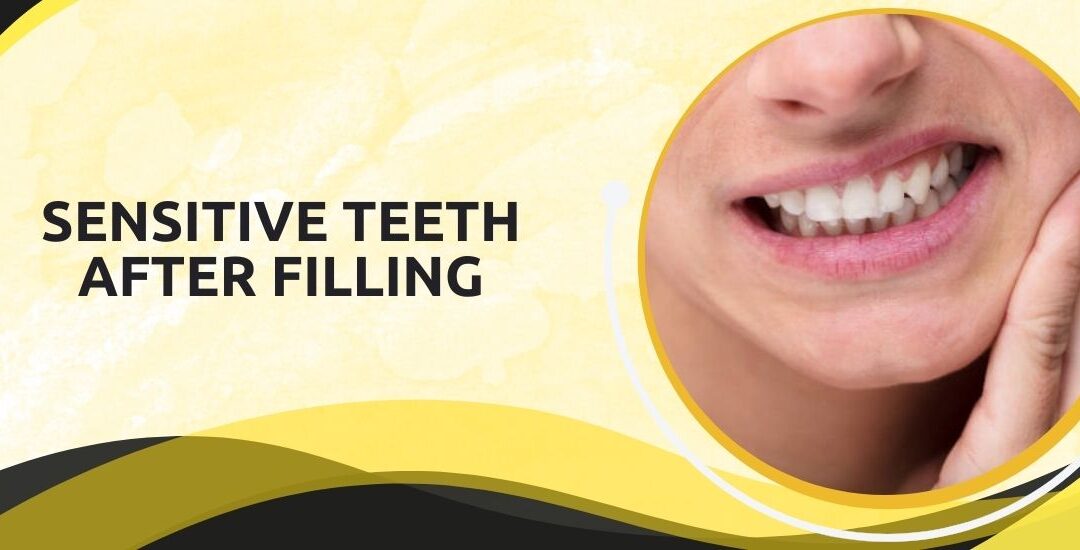Sensitive Teeth After Filling

According to Dr. Jahnavi Patel, a leading dentist in South Bopal, “Tooth sensitivity after a filling is quite common, but in most cases, it is temporary. With the right care, patients usually adapt well and regain comfort.” With over 10 years of experience in dentistry she has helped many patients manage this concern effectively.
Wondering why your tooth feels different right after treatment?
Why Do Teeth Become Sensitive After a Filling?
When a filling is placed, the tooth undergoes changes. These changes can temporarily affect the nerves inside the tooth, leading to sensitivity.

- Pulp irritation: During the procedure, drilling and cleaning may irritate the inner layer of the tooth.
- Bite alignment: If the filling is slightly high, it can cause uneven pressure when biting, leading to discomfort.
- Material reaction: Some filling materials, especially metal-based ones, conduct temperature changes more readily, increasing sensitivity.
Dr. Jahnavi Patel explains, “It’s important to understand that sensitivity doesn’t always mean something is wrong—it’s usually a natural response of the tooth adjusting to the treatment.”
Here’s what you need to know.
How Long Does Sensitivity Last After a Filling?
Most patients notice that tooth sensitivity after filling gradually subsides within a few days to a few weeks.
- Mild cases: Discomfort lasting for 1–2 days.
- Moderate cases: Sensitivity persisting for up to 2 weeks.
- Persistent cases: If pain after dental filling continues for more than 3 weeks, it may need further evaluation.
The duration often depends on the size of the cavity, the filling material used, and the overall health of the tooth.
Common Triggers of Sensitivity

Certain factors can intensify sensitivity after a cavity filling, making the discomfort more pronounced.
- Hot or cold foods: Ice cream, hot coffee, or chilled water can trigger discomfort.
- Sweet foods: Sugary snacks can increase irritation.
- Biting pressure: Chewing on hard items like nuts or candy can worsen the pain.
- Temperature shifts: Moving from hot to cold foods quickly may intensify sensitivity.
Recognizing these triggers can help patients make small adjustments to their daily habits while the tooth heals.
How to Relieve Sensitivity After a Filling
If you are dealing with sensitive teeth after filling, there are several ways to reduce discomfort.
- Desensitizing toothpaste: Regular use can reduce nerve sensitivity.
- Avoid extreme temperatures: Stick to lukewarm foods and beverages.
- Good oral hygiene: Keeping the area clean helps the tooth heal better.
- Saltwater rinses: This can reduce inflammation and soothe irritation.
- Pain relievers: Over-the-counter medications can provide short-term relief if recommended by the dentist.
When Should You See a Dentist?

Mild sensitivity is common, but prolonged or severe pain after dental filling should not be ignored.
Signs that indicate the need for professional help:
- Sensitivity lasting more than 3 weeks
- Sharp, persistent pain when chewing
- Swelling or signs of infection around the filled tooth
- Visible cracks in the filling
Prompt evaluation helps prevent complications and ensures that the filling is functioning properly.
Check out the ways to avoid it.
Preventing Sensitivity in the Future
While not always avoidable, certain steps can reduce the chances of tooth sensitivity after filling.
- Choose the right filling material: Composite fillings often cause less sensitivity than metal ones.
- Follow proper oral hygiene: Brushing twice daily with fluoride toothpaste strengthens enamel.
- Regular dental visits: Early detection of cavities prevents larger fillings and lessens sensitivity.
- Avoid grinding teeth: Wearing a night guard may be advised if grinding is an issue.
As Dr. Jahnavi Patel emphasizes, “Preventive care plays a key role in reducing the risk of post-filling sensitivity. The healthier the tooth is before treatment, the faster it adapts afterward.”
Conclusion
Sensitive teeth after filling are quite common and usually temporary. With proper care and timely attention, the discomfort can be managed with ease. At Dentafix Dental Clinic in South Bopal, Ahmedabad, patients are supported with expert care and personalized solutions to restore comfort and maintain healthy teeth.
Frequently Asked Questions:
1. How long do fillings last?
2. Why teeth hurt after filling?
3. How long will my teeth hurt after a filling?
4. How to stop sensitive teeth pain immediately?
5. Can fillings make teeth more sensitive?
6. Is it normal to have sensitive teeth after a filling?
References:
https://www.healthline.com/health/tooth-sensitivity-after-filling
https://www.webmd.com/oral-health/problems-dental-fillings
Disclaimer:
This content is for informational purposes only and does not replace professional dental advice. Please consult a qualified dentist for diagnosis and treatment of any dental condition.





